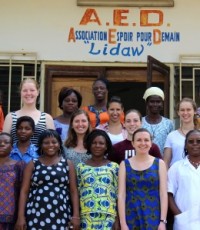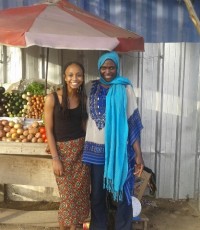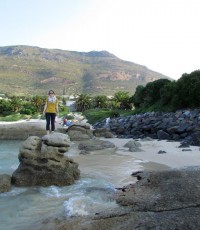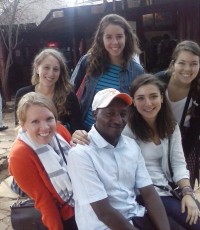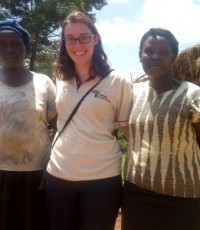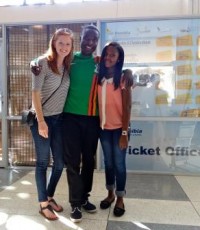September - October 2014
Dear Friends,
We have another edition of our Fellows Flyer to share with you! All of our 2014-15 Fellows are now busy at work across the African continent, supporting our incredible partner organizations. Although they’ve only been at their fellowship posts for a short time, we are amazed by what they’ve accomplished thus far. Just a few examples include:
+ Coordinating a social media fundraising campaign to raise money for fistula surgeries in Tanzania
+ Helping install three new water tanks in a village in Kenya
+ Writing and coordinating grant proposals to help better meet the health needs of HIV-positive women and “Mentor Mothers” in South Africa (read more below!)
We were excited to read the results of our 2013-14 supervisor/partner survey. Partners like the International Rescue Committee, UN World Food Programme, Kucetekela Foundation and mothers2mothers host PiAf Fellows year after year — and the reason is clear. Our Fellows are able to make an important contribution to their work — for example,
+ 95% of supervisors who responded said they were either “Very Satisfied” or “Satisfied” with their PiAf 2013-14 Fellow overall.
+ 97% of respondents described the quality of their Fellow’s work as “Excellent” or “Good.”
+ 97% of respondents said that they would recommend partnering with PiAf to another organization.
We are very proud of our new Fellows and all the Fellows we’ve placed over the past 15 years, and grateful to our partner organizations for the opportunities they provide across Africa. We hope you enjoy this edition of the Fellows Flyer!
Warm regards,
Katie Henneman
Executive Director
P.S. We are now accepting applications for 2015-16 fellowships! Graduating seniors and young alumni from any accredited U.S. college or university are eligible to apply. For more information, check out our website at www.princetoninafrica.org
PiAf Connections
Please click below to check out pictures of our Fellows, Alums and other members of the PiAf family meeting up at home and around Africa.
Notes from the Field
By Emily Bensen, 2014-15 Fellow with Hope Through Health in Togo
Rounding out my third month in Kara, Togo, I’m getting used to living my life in French instead of English, and am sinking my teeth into my work as the Research and Advocacy Fellow with Hope Through Health (HTH). HTH is the technical and financial partner of the Togolese NGO, Association Espoir Pour Demain (AED), which provides support for HIV-positive members of the Kara community. In order to provide a few snapshots of my life here, I’ve decided to share two of my favorite Togo (and life) pastimes: collecting quotes and writing in my journal.
“A long journey begins with one step.”
-Kikuyu proverb, Kenya
6/15. On Thursday, I received my first real work assignment! I’m working on finding the survival rate of our patients on antiretroviral treatment. I’ve found that patients are more successful if they receive treatment early—this is especially important for AED because we often see patients for the first time when they are already in advanced stages of AIDS. My boss, Emmanuel, asked me to present these findings at the staff meeting on Monday morning…wish me luck!
“Keep smiling, it makes people wonder what you are up to…”
-Unknown
6/17. Today, I attempted to do my laundry. I filled up my buckets with water and started splashing away, soaping up my clothes in one bucket, and rinsing them out in the other. My neighbors stared at me—the white girl who’s new to the compound trying to do her laundry—in silence, the whole time. I tried to keep a constant smile on my face and make eye contact with them every so often as if to say, “Ah, I just love doing my laundry like this and it comes so naturally to me, see?”
“All alone! Whether you like it or not, alone is something you’ll be quite a lot!” -Dr. Seuss
8/24. This morning I went to church, by myself. A month ago, I would have anxiously texted everyone in my phone (totaling about seven people I think…) asking if they wanted to come with me. But today, I just showed up and sat down. It was the same satisfaction as when I finally felt comfortable eating a meal by myself in the dining hall in college. It’s ok to be alone among lots of people—I’m starting to feel at home here.
“Disease and disasters come and go like rain, but health is like the sun that illuminates the entire village.” -Luo proverb, Lake Victoria
8/27. After a few minutes, Anisha welcomed everyone and introduced the theme of the day’s discussion: side effects of antiretroviral treatment. She asked the kids to go around the circle one by one and talk about some of the side effects they experience from taking their medicine. The first girl, about 15, was a little shy. She covered her mouth with her hand and whispered, “After I take my medicine, I feel really dizzy. I think they call it vertigo.” A boy across the circle stood up in excitement and called out, “I know exactly what you mean!” Everyone giggled and nodded in agreement. Today I have the kids to thank for a break from the hustle and bustle of the administrative building and a reminder of our common mission: for HIV-positive Togolese to reach their full potential.
It’s a momentous time to be living in West Africa, and I feel more passionate about the importance of global health than ever. While I am saddened by the news day after day, I am ever grateful for this opportunity to be involved in strengthening health systems and addressing the complex social determinants of community health.
Notes from the Field
By Yasmin Dagne, 2014-15 Fellow with UN World Food Programme in Senegal
As the Projects Cycle Fellow at the West and Central Africa Regional Bureau of the World Food Programme, I help prepare project documents for approval by their respective authorities. These responsibilities can include anything from editing content and format to liaising with various technical units at the country, regional, and headquarter levels.
I met the women of Fenêtre-Mermoz on an evening stroll, in search of adventure and bell peppers. Adji stood beaming in front of her vibrant display. She comes from Kaba, a village about 200 km from Dakar, in Thiès region. She sells vegetables with Fatou, Awa, and Georgie. Georgie sells jus de madd, a seasonal drink made with sugar, ice, and madd, the eponymous wild fruit native to Senegal and found in the southern region of Casamance, where Georgie is from. Adji’s day begins at six in the morning, at the vegetable market near Rufisque, a once bustling port city now situated in the suburbs of Dakar. Her stand is open from nine in the morning until seven in the evening. Endowed with an entrepreneurial spirit – as most African women are – Adji also braids hair.
Kenyan actress Lupita Nyong’o said, “Braiding hair is an intimate thing.” Hair braiding calls for unspoken trust: You present your hair and scalp as an ink and canvas, to experiment and explore different shapes, angles, and styles. The simple dynamics of hair braiding forces physical intimacy: your stylist rests her forearms on your damp forehead. She casually brushes her tired fingers across your face only to betray the calm when she digs the comb into your scalp to part your matted hair. As any African woman can attest, each hair braiding experience unlocks memories of the countless hours our mothers, sisters, and aunts spent braiding our hair as children.
Hair braiding is also an important social ritual, both in its physical act and in the various characteristics – tribe, wealth, and religion – different styles communicate. For example, most taximen, guardians and fruit and vegetable stand owners greet me in Wolof, the most widely spoken language in Senegal and the language of the Wolof people. My most recent hairstyle, however, is common to East Africa. Two days with my new hair and for the first time since my arrival in Dakar two months ago, a man greeted me in Pulaar, the language of the Fulani people. The Fulani are spread throughout West, Central and, interestingly enough, East Africa. A new hairstyle enabled me to cross an invisible boundary between ethno-linguistic groups.
At this modest vegetable stand, tucked away under a faded pink umbrella, I am inspired by the grace, humility, and kindness of Adji, Fatou, Awa, and Georgie. As Adji braided my hair, we talked about our families and life in Dakar. After about two hours, a comfortable silence settled. Enveloped in the soundtrack of a bustling main street on a hot Saturday afternoon, I ruffled through old copies of AMINA Magazine, an African women’s magazine, and imagined the web of relationships forged at maisons de coiffure across the continent.
Notes from the Field
By Chelsea Lee, 2014-15 Fellow with mothers2mothers in South Africa
I love to bake – so much so that the first question my friends asked about my move to Cape Town was “so you’ll have an oven, right?” One of the best ways to make new friends in South Africa is by preparing, eating, and sharing food together. It’s still a work in progress, but below is my recipe for a successful fellowship year in my favorite city.
PiAf Fellowship in Cape Town
Makes 12 (incredibly transformative months)
Ingredients:
+ Curiosity & Humility: South Africa is incredibly diverse and rapidly changing. The longer I am here, the more I realize how much I don’t know and want to learn about public health, structural inequality, and my role here as a Fellow and an American.
+ Humor: Things won’t always go as planned, and it’s crucial not to take yourself too seriously. I had the chance to go on a site visit and learned just before we arrived that I should greet the group in Xhosa and participate in song and dance before the meeting started. My awkward and uncoordinated attempts at both generated a lot of laughter, but it’s one of my favorite experiences thus far.
+ Patience: Things move more slowly here (and you might actually learn to love that!).
Instructions:
+ Serve where you’re needed: My fellowship is with the Business Development Team at mothers2mothers (m2m), which employs and empowers women living with HIV to serve in understaffed health centers as Mentor Mothers, providing education and psychosocial support to other HIV+ mothers. This has undoubtedly been the most rewarding part of my experience, but it’s often hard for people outside of the organization to understand what I do. I don’t administer programs, interact daily with project beneficiaries, or conduct assessments of m2m’s impact on public health systems – but I love my job. I write and coordinate grant proposals that allow m2m to better meet the health needs of the women it serves. The funding strategies we create make it possible for a pregnant woman diagnosed with HIV to receive assurance and support from a Mentor Mother who has been there herself. I don’t have a lot of bloggable moments from my day-to-day work life – unless you want to hear about which budget notes I need for tomorrow’s meeting – but my position affords me an inside look at the intricacies of grant funding and foreign aid and gives me a better understanding of how all of the organizational pieces fit together to improve public health outcomes.
+ Say yes! While my daily work experience doesn’t involve community engagement, I have found plenty of other ways to integrate myself with city life just by being willing to try new things. In my short time here, I have been sea kayaking with whales, climbed beach boulders to find penguins, and hiked a mountain by the light of a full moon. From braais (South African barbeques) and local food markets with new friends to opera and live art performances, there’s always something interesting happening in the Mother City.
Notes from the Field
By Camille Pendley, 2014-15 Fellow with International Rescue Committee - Somalia (based in Kenya)
“Chege, sa sa? Poa sana. I’m at The Hood. Could you pick me?”
This Swahili/Kenyan-English monologue alone reminds me that I’ve been in Kenya for a couple of months, and that life here is engaging, unexpected, and very social.
I work in the grants unit of the International Rescue Committee’s Somalia program with highly accomplished colleagues from near and far; some from right here in Nairobi and other areas of Kenya, many from Somalia, others from Uganda, Italy, France, the US, and elsewhere. Already I’ve been able to explore work in areas I’d hoped I would, including communications, advocacy, women’s rights, and emergency response. Being in this capital and East African hub offers many opportunities to meet others working in the humanitarian field, both professionally and socially. Engaging professionally with various actors has been fascinating; a recent meeting was spent brainstorming key points on which to align and advocate with donors and governments in light of the pending drought in Somalia and South Sudan.
True to what I’ve observed about life in the NGO world generally, overlapping professional and social realms have consisted of equal parts “work hard” – often coordinating efforts to alleviate the hardship of beneficiaries’ incomprehensible realities – and “play hard” – unwinding with these same colleagues in a much lighter context.
It’s not uncommon to find such a group socializing at The Hood Place. At best, it’s a bare-bones local happy hour spot with “nyama choma” (roasted goat) known city-wide; at worst, a self-served smattering of Tuskers (East African brewery favorite) atop plastic tables in a gravel yard. Regardless, the eclectic mix of Celine Dion, Babyface, and Boyz II Men on the rigged outdoor sound system never ceases to delight expats and locals alike. On its worst day, The Hood is still my favorite spot in this city.
It is here that I’ve had conversations with new Kenyan acquaintances post-political-rally, comparing the merits and downfalls of a proposed bill limiting executive power; here I gleaned insights on the meaning of marriage in Kenyan culture. Fellow PiAf Fellows often meet here to share anecdotes from the day’s work, newly learned Swahili, adventures exploring lesser-known neighborhoods, unexpectedly personal conversations with security guards, and other pieces of the Kenyan life we are coming to know “slowly slowly.”
Chege is the driver/businessman/father/comedian I’ve come to look forward to seeing. (Not so coincidentally, he loves The Hood.) He joined me and some friends at the giraffe sanctuary one Saturday (see pictured) and may have enjoyed the animals more than any of us did. He’s promised to bring his two children – one eight years old and one three– to meet us “next time.”
For me, this fellowship experience is nothing without meeting people and learning about what life in Nairobi means to them. I look forward to many more evenings at The Hood and elsewhere to do just that.
Notes from the Field
By Lavina Ranjan, 2014-15 Fellow with Maru-a-Pula in Botswana
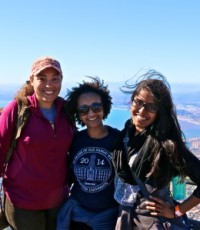
Lavina (right) with fellow 2014-15 MaP Fellows Lauren Richardson (left) and Nada Ali (center) on a trip to South Africa.
Friendliness, openness and kindness. Three words I would use in a heartbeat to describe my new family in Botswana. In general, the Motswana people are very welcoming and friendly, which has really helped the transition into this new home. However, I think the 2013-14 Maru-a-Pula Princeton in Africa Fellows (Fritz, Phoebe, Riley, and Kwame) embody the definition of this entire program. Not only were they extremely welcoming and caring, but they also took every measure they could to make the changeover into our roles at Maru-a-Pula and the local community as easy as possible. From my first night in Gabs, I was out with the older Fellows meeting their friends, playing ultimate Frisbee, and going to eat at Bull and Bush. At work, they taught me all the tricks to find good internet, who to talk to get things done, and the secrets of the Annex.
At MaP, I have taken on a lot of the additional roles that the previous Fellows had outside of teaching because of their encouragement and love for the school. Phoebe encouraged me to help out with Bridge Club and the girls’ boarding house, and I am already looking forward to both of these new roles next term. Riley clearly enjoyed helping out with the athletic extracurricular activities during her fellowship, which pushed me to volunteer to be the new Pilates instructor at MaP. All four of them also had invaluable advice on teaching. They knew so many of the kids personally and knew how they learned best, and this advice really improved my effectiveness in the classroom. Socially, the former MaP Fellows took us to braiis (barbeque), Frisbee games, and Kgale Hill for rock climbing – just to name a few events.
I think without the older Fellows, I would have had a much more difficult time navigating the MaP community, as well as making friends outside of work. They really showed me how familial Princeton in Africa truly is and I am so grateful for everything they have done. They will be sorely missed, but I wish them the best of luck with all of their new adventures! Thank you Fritz, Riley, Phoebe and Kwame!!
Notes from the Field
By Katherine Reott, 2014-15 Fellow with Village Enterprise in Kenya/Uganda
She stands proudly in front of her chickens as I take her picture to complete my “spotcheck.” Her name is Damaris and, together with two other women, she operates a business rearing chickens in rural Kitale, Kenya. Her business started because of Village Enterprise, an organization for which I have the privilege of working through a Princeton in Africa placement. Village Enterprise (VE) works with rural populations living in extreme poverty and gives them business and financial training, mentoring, and a startup grant to run a business. Spotchecks are completed by VE staff with the goal of identifying any problems, either with the business or with our program, so they can be addressed as early as possible.
I always feel bad for my Kenyan colleagues, on whom I must rely heavily if I’m to complete a successful spotcheck. All I can hope is that the entertainment of traveling with the “mzungu” is enough compensation. Once, I attracted an audience of 15 people, curious about what the mzungu was doing in their village. Another time, when I pulled out a tube of sunscreen, my colleague politely warned me that “people are going to stare at you if you start putting that on.” He was right.
For every laughable “mzungu moment” I have, there are twice as many moments where I’m reminded just how little I understand about the lives of our program participants—and, therefore, how grateful I am that I’m only two months into my fellowship. For someone who is miles away from home (in every sense of the word), I’ve found spotchecks to be the most grounding and educational thing I can do. They’re the perfect way for me to learn exactly what it means to be part of the “extreme poor” in my area (a hard thing to grasp until you see it firsthand). Meeting our program participants always reminds me why I’m here, why I voluntarily left bustling Chicago to live in rural Kenya. And, if nothing else, spotchecks are the perfect excuse to get out of the office and experience the lush greenery that western Kenya has to offer. Every spotcheck is different, which is one of the things I love about doing them, but one thing seems to remain the same: in at least some small way, the life of the person sitting in front of me has changed because of Village Enterprise. After two months as VE’s Princeton in Africa Fellow, I can honestly say the same.
Damaris’ business is named Tumaini, which is Swahili for “hope.” I couldn’t think of a better name for a Village Enterprise business.
Notes from the Field
By Oluseyi Segun, 2014-15 Fellow with Gardens for Health International in Rwanda
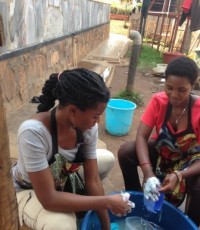
Oluseyi (left) helping the GHI cooking staff prepare lunch during a lull on a Friday afternoon at work.
Life in Rwanda has been everything I expected and more. Just 1.5 months into my fellowship, I feel that I have already learned so much from my new way of living and my work with Gardens for Health International (an international NGO that uses agriculture to combat chronic malnutrition). It is safe to say that learning seems to be pretty indicative of what my experience at my fellowship post has been like so far.
Be it that I am working with colleagues to learn useful words in Kinyarwanda, figuring out how to bus into the city centre, learning to run at altitude (I literally thought I was going to have a heart attack the first time I ran here), or having to negotiate at the market and for my moto, I feel like my brain is constantly on absorb mode and that I am being pushed out of my comfort zone.
At work I have had the opportunity to expand my responsibilities, and I get to work pretty independently. I came in as the Communications Fellow (which I still am) and was tasked with managing all aspects of our social media. But now, I have also been able to take on grant reporting. It will now be my responsibility to keep abreast of all the different grants that we have won and make sure that I report to our Executive Director as to when something is due for those grants (ahead of time!) so that she can reach out to the right people to send in those reports.
At my home, I get to straddle the American-Rwandan balance with one roommate being a Rwandan Global Health Corps Fellow (GHC) and the house staff Rwandan, while living with Americans who work for the organisation and who are also GHC fellows. It might sound strange to say that I am straddling the American-Rwandan divide. But as seamlessly as I have clicked with the Americans, I honestly have to say that I have done so, too, with the Rwandans.
For work, I can be in or out of the office as much as I want, as my job regularly requires me to be in the field. I have had the opportunity to travel around the two districts Gardens for Health works in – Musanze and Gasabo – while also doing personal travel to neighbouring cities such as Rwamagana.
Overall, it is still a bit surreal to be in Rwanda. I know that there is a huge learning curve for me. But, I am ready for the challenge. I feel really privileged to have all the experiences that I am having, and I feel really fortunate for my amazing colleagues and for the Rwanda-based Princeton in Africa Fellows, with whom I’m sharing many of these experiences.
Notes from the Field
By Olivia Thompson, 2014-15 Fellow with Kucetekela Foundation in Zambia
The most entertaining part about the time I spent preparing to move to Lusaka was watching strangers’ reactions when I told them I was moving to Zambia in one week (or two days, or a couple of hours). Responses varied from ‘where’s that’ to ‘what’s that’ to one flat-out ‘why.’
As for the ‘what’ and ‘where,’ Zambia is the beautiful “butterfly heart of Africa” that’s oddly-shaped enough to border eight countries in southern Africa. In Lusaka, it’s where you get awfully trapped in traffic after 4:37 pm, where you can purchase anything from chickens to children’s inflatable life jackets to oranges by men standing in between driving lanes, and where people will bend over backwards to lend a hand.
As for the ‘why,’ I moved to Zambia to work as a Programs Coordinator for an organization that provides an amazing group of intelligent yet vulnerable children a quality secondary education. Without the support of the Kucetekela Foundation, these students would not have the opportunity to attend secondary school, let alone have the access to a quality institution. In addition to receiving a comprehensive scholarship from Grade 8 through 12, KF pairs each student with a mentor to act as a positive role model, encourages students to give back through community service projects, and provides internship and work experience opportunities. This month, ten KF students left Lusaka to attend various IB programs and universities in Costa Rica, Ghana, the US, the UK and India. As I’ve watched these students depart for different ports and programs all around the world, I have been both humbled by and proud of the grassroots, hands-on efforts of this small yet powerful organization.
As the three-month mark to my fellowship draws near, Lusaka has begun to feel like home. During my month-long homestay, I picked up a few Nyanja greetings, learned how to properly eat nshima, and sat at the high table of “my second cousin’s” village wedding. I’ve embraced the funny looks I get as a ginger in a giant grey minibus, trying to navigate the narrow compound roads sprinkled with sleeping dogs and eager children flashing a thumbs-up. Seeing smoke and fire no longer elicits a panicked reaction, as I know it’s just the solution to eliminating garbage. Most importantly, I can (almost) drive around Lusaka without having to consult my map. For the remainder of my fellowship year, I look forward to expanding KF’s marketing materials, deepening the impact of our community service projects, and selecting the next class of KF scholars!



